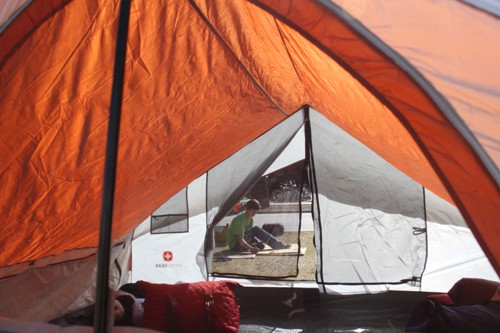Students from the Social Justice League are taking the concept of walking in another’s shoes to the next level.
Members of the club are participating in a simulation this week of what it is like to live without a home in what organizers call an effort to bring the realities of homelessness to the UA campus.
In addition, participants will be collecting canned goods, pillows, blankets and money for Casa Maria, a local homeless shelter and soup kitchen.
Participants will go without the luxuries that most students are accustomed to — no bed, shower, computer, cell phone, iPod and no meals other than what is donated through an arrangement with Dining Services.
“”Dining Services is donating leftovers from various restaurants across campus for our meals, said sociology senior Hali Nurnberg. “”We want to begin to feel the stresses that the homeless live on a daily basis.””
The experiment will take place throughout the week on the UA mall and in the Gittings gymnasium where approximately 30 students a day will participate.
“”Any student can participate as long as we have enough food and t-shirts to go around,”” said molecular and cellular biology senior Clark Alves.
Nurnberg got the idea for Tentropolis two years ago while participating in a National exchange program with Bridge Water State College in Massachusetts.
“”I liked the idea because it takes participants out of their comfort zone and begins to expose them to the hardships of being homeless,”” she said.
Tentropolis is one of three homeless simulations conducted by college students across the country. Students in Massachusetts and Vermont are simultaneously conducting the simulation and holding nightly discussions.
Nightly discussions will revolve around the participants’ experiences in Tentropolis as well as how college students can work to address the problem on a large scale.
“”A lot of clubs and organizations show movies, we are trying to create an actual environment and then discuss our experiences,”” said anthropology sophomore Merlynda Sol.
Two speakers a day from a variety of community centers, soup kitchens and shelters will talk about their own personal experiences working with the homeless. Members of the league said they hope the discussions will help to break down stereotypes and assumptions about the homeless community.
“”A lot of people have this concept of a drunk bum, but a lot of people who are homeless have done everything right,”” said Nurnberg. “”The homeless have no political clout.””
Nurnberg said she talked to multiple people at the university who have been homeless.
“”Its astonishing how many people at the university have homeless experience,”” she said. “”I talked to a student last year who had lived out of a car while attending the UA.””
Interdisciplinary sophomore Bethany Benedict said Tentropolis is her way of doing more to help.
“”I remember seeing a particular homeless family several years ago. The mother had three kids and she was pregnant, it really bothered me,”” she said.
With foreclosure rates at an all time high, more and more people will be getting homeless experience in Arizona this year whether they are part of a social experiment or not.
Participants in Tentropolis said they hope their simulation will help change the perspective that many students have about the homeless.
“”This is my way of standing with the homeless,”” Benedict said.








